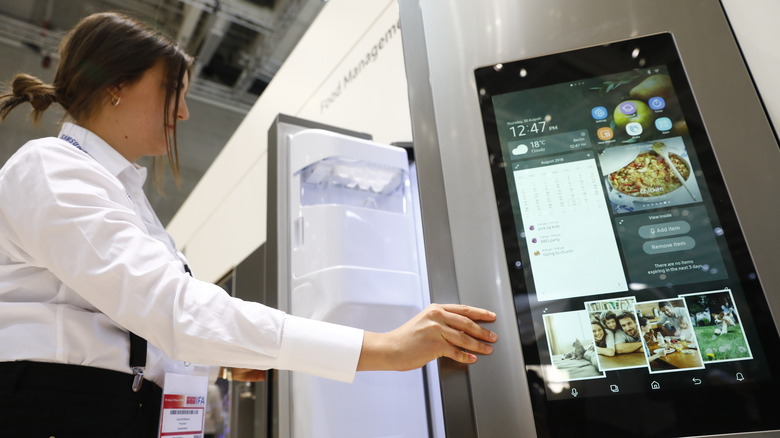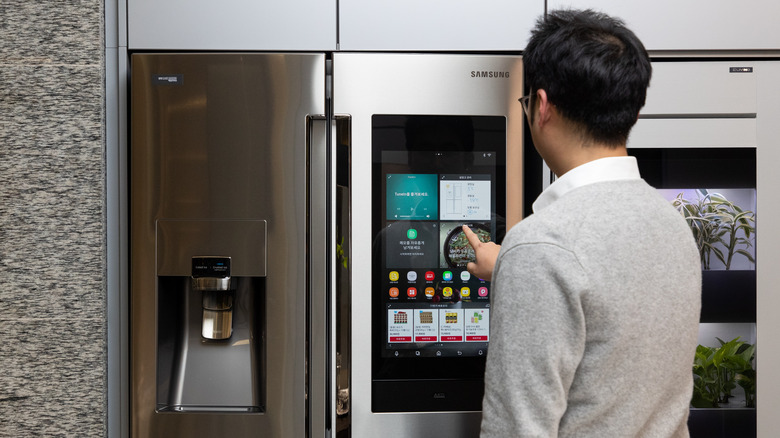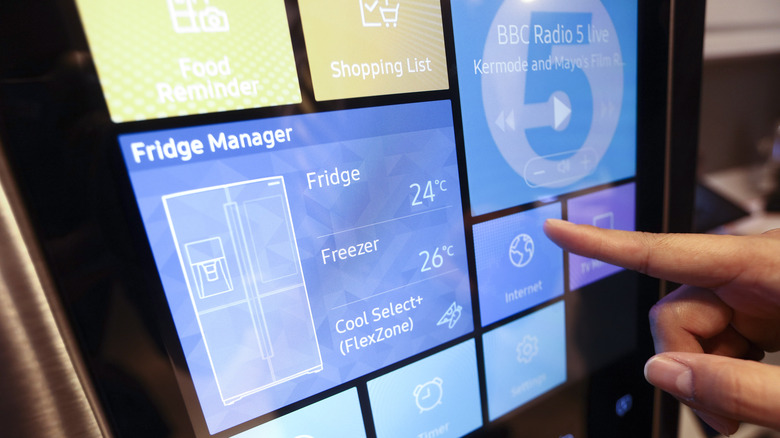Are Smart Refrigerators Actually Useful? Or Are They Just A Gimmick?
Some smart home gadgets make more sense on the surface than others. Many can benefit at least from adding app-based controls instead of using included remote controls. Air conditioners, for example, gain the ability to be controlled from outside the home. You can turn them on a few minutes before you get home so you don't have to arrive at a hot and humid house or apartment. Smart lights let you adjust your lighting in various ways from anywhere in the room. Smart doorbells let you answer the door like you're there, even if you're not home. And so on.
The immediate benefits of a smart refrigerator are a little bit more opaque, though. Most refrigerators are appliances we only have reason to interact with if we need to put something in or out of them. They have controls, but not the kind of controls you'll have any reason to interact with regularly. Any kind of smart refrigerator worth its while would have to change how you think about and interface with your refrigerator in ways that a lot of smart appliances don't need to.
With that in mind, do they reinvent the wheel? Or are they just a fad trying to capitalize on the smart home trend?
What makes a refrigerator smart, anyway?
A lot of what distinguishes a smart refrigerator from a regular one and makes it a desirable product comes down to cameras and sensors. A smart fridge makes it easier to keep track of what's inside, when you'll run out of different food items, and when they'll spoil. It also provides better control of temperature and humidity — particularly in individual drawers/compartments — to keep your food fresher. It can also tell you if certain parts need repairs, and if you have a refrigerator with a water filtration system built in, it can tell you when the filter needs to be changed. By the same token, smart refrigerators are often more energy-efficient because of their adjustments based on the sensors.
Beyond that? It's another touchscreen-based computer in the home with all that entails. You can use it as a whiteboard, watch TV on it, look up recipes on it, and have it read recipes to you. But that's not the kind of thing that's worth paying a major premium over a regular, not-so-smart refrigerator. Whether or not a smart refrigerator is right for you comes down to your budget and how much the sensor-based features appeal to you.
What's not so great about smart refrigerators?
Let's get this out of the way first: If you rent your home, you might as well stop here because your landlord handles refrigerator repairs and replacements. For homeowners, though, who might be in the market for a new fridge, the most immediate issue is the price difference.
Going by what Best Buy has available for refrigerators with 23 to 25.9 cubic feet of space as of this writing, regular refrigerators start at $899.99, with recognizable brand names like LG, Frigidaire, Whirlpool, and GE all have fridges towards the lower end of the price continuum. The smart models start at $1,599.99 for an LG model without a screen built into the door or $2,799.99 for touchscreen models starting with one from Samsung. It's a big difference, particularly if you want a screen built-in, all complicated by the fact that the smart features are liable to break down before the rest of the fridge does.
Without unlimited resources, justifying the cost of a smart fridge requires:
- Being a homeowner.
- Who has well-founded concerns that they're wasting large amounts of food due to spoilage and/or spending too much on the electricity required to run their refrigerator.
- Can justify paying the premium price that can reach thousands of dollars to mitigate those long-term energy costs.
Those are a lot of what-ifs for buying a new smart refrigerator.


